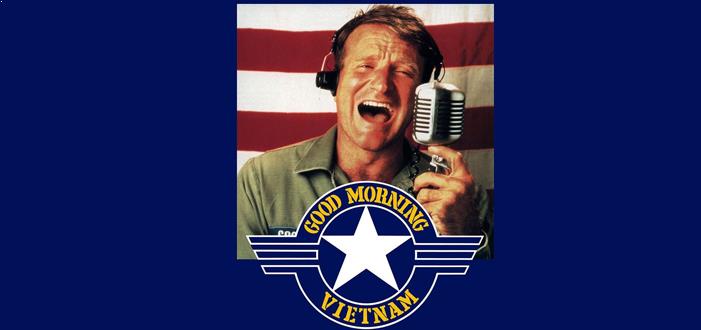
Good Morning Vietnam
War. What is it good for? The rhetorical question is stereotypically created when a film concerns itself with the Vietnam conflict which escalated into a war. Yet with Good Morning Vietnam we see not a guilt complex that holds the hand of the stereotype which seeks in its effort to humanize people mutilating themselves while trying, ultimately in a higher plane, to accomplish the same goal which is self-fulfillment. Instead we see the humanity of sustaining morale, and therefore the psychology, of the participants in human violence.
Humans are not machines and never will be. They are much more beautiful than becoming routinized operations to perform one specific task ad infinitum. This is stating the obvious, but it is failed to be grasped when talks about fighting things that go bump in the night out there, with the out there which typically extends beyond the limits of one’s boring suburban neighborhood. War is too convenient these days. And that convenience paradoxically makes it easy to be capricious about it. Contrasted with military history where conflicts typically lasted several years, the moment things don’t go according to plan these days a politician is available to support the whining brotherhood of infantile men.
No, Vietnam does not fall neatly in place with this example, because the whining was explicitly with the capture of young men to be thrown into a war machine actuated by older clueless men trying to resist the contagion that is the self-entitled proletariat. Self-entitled proletariat condenses the totality of 20th century violence, as the mass man grew to become dominant thanks to the sophisticated techniques of human conditioning and overthrew the ruling aristocratic class and utilized the tool of mass conscription to kill himself. For the very plain reason that he is unaccustomed to responsibility and planning his life, he is ruled by his vacillating emotions like a child, to paraphrase Hitler. Vitenam was simply the moment in the American side of his two-faceness whereby he realized the machine he built was ending his life. And yet the complexity of that conflict was that capitulating to Soviet agglomeration was the perpetuation of this suicide machine. Thank goodness for the sake of humanity central planning doesn’t work, and the theft of Russian private property instigated by the Bolsheviks necessarily petered out, leaving the Russian people with a declining birth rate and a leader that by necessity has to ride on horseback shirtless to provide morale to his broken nation, broken because the poor thought they were entitled to more ownership of society by the very nature of their existence.
And so we return to the necessity for morale to keep a war in perpetuation. For at the end of the day, he who is persistent in his effort at domination will be the one holding the pen and making the ink that spells out history. Good Morning Vietnam therefore is original in circumventing the tedium of shame that aging Baby Boomers needed to feel in the 1980’s in order to reinvigorate their lifelessness; the anthology of Vietnam film is for them to reminisce about what they pretended to accomplish, which was an end to American involvement in the self-determination of the Vietnamese people. For in parallel with the release of World War Two films after that conflict, both sets of audiences are seeking to be proud of their involvement. The former however must be proud of the impoverishment it left the Vietnamese, for very readily we can see the discrepancy in the quality of effort by the Americans in defending the natural rights of Vietnam and Korea. The latter is a thriving and bustling rich nation, and has ostensibly overtaken Japan as the kings of Asian consumer electronics – Samsung has replaced Sony in the consciousness of the American consumer. Yet what can be said about Vietnam, or for that matter, any of the former Soviet provinces and protectorates?
It is a simple joy that this film does not become political and instead showcases richly the beyond rare and beyond unique talent that existed in the soul of Robin Williams. One must consistently ask how often the script was pure improvisation. He is so natural in his chaotic comedy that one must wonder if his lack of such energy in his later works was due to his aging or due to his hidden substance dependency. Or was his substance dependency caused by his lack of comedic rampaging that fomented his rise from a stand-up to a movie star?
Further still in the film is the exploration of the social dynamics of power within a human hierarchy. And thankfully positively the film portrays the top dog, the general, as a noble spirit. He understands intimately the significance of troops with a smile on their face. Of course it doesn’t hurt that he finds the radio man played by Robin Williams to be funny, but the point is that the rank officials who resent the humor possibly because they don’t see its utility in warfare because they don’t have the intelligence to, also don’t have the will to swallow their pride, recognizing the grander benefit to their troops. And in fact we see the simian rear its hideous skull in one poignant moment in the film.
To conclude by circling back on the critique that is allowable when watching a film stand-off from the politics of Vietnam, the main Vietnamese boy in the film fills his face with tear streams because he cannot comprehend the virtue of American military in his homeland, especially when the ones he loves are dead as a direct or indirect result of it. He cannot transcend his emotional cognitive faculty, taking his mind into the abstract to understand a higher order of how the world works. So he retaliates against the pain and the suffering the world has inflicted on his soul the only way he can. Retaliation towards pain to rectify it is a fantastic summary.
Grade: B+

